External links
| This article about a German academic is a stub. You can help Wikipedia by expanding it. |
Erling von Mende (born October 10, 1940) has been professor of Sinology at the FU Berlin since 1983. He is specialised in the social and economic history of the early Song dynasty to the end of the Qing dynasty.
In 1969 von Mende gained a PhD in Sinology, economic history, Manchu Studies in Cologne. His 1971 dissertation was entitled Die wirtschaftlichen und konsulären Beziehungen Norwegens zu China von der Mitte des 19. Jhs. bis zum 1. Weltkrieg ("Economic and consular relations between Norway and China from the middle of the 19th century to the First World War").
Von Mende qualified as a university lecturer in 1979 in Cologne, specialising in Sinology and Manchu Studies. In 1982 he wrote a study, China und die Staaten auf der koreanischen Halbinsel bis zum 12. Jh.: Eine Untersuchung zur Entwicklung der Formen zwischenstaatlicher Beziehungen in Ostasien ("China and the states on the Korean peninsula until the 12th century: A study for the development of the forms of intergovernmental relations in Eastern Asia").
His father is Gerhard von Mende.
| This article about a German academic is a stub. You can help Wikipedia by expanding it. |

Karl August Wittfogel was a German-American playwright, historian, and sinologist. Originally a Marxist and an active member of the Communist Party of Germany, after the Second World War Wittfogel was an equally fierce anti-communist.

Baron Dr. Carl (Karl) Ludwig von Reichenbach was a notable chemist, geologist, metallurgist, naturalist, industrialist and philosopher, and a member of the prestigious Prussian Academy of Sciences. He is best known for his discoveries of several chemical products of economic importance, extracted from tar, such as eupione, waxy paraffin, pittacal and phenol. He also dedicated himself in his last years to research an unproved field of energy combining electricity, magnetism and heat, emanating from all living things, which he called the Odic force.
Lothar Ledderose is a German professor of the History of Art of Eastern Asia at the University of Heidelberg. A renowned authority in his field, he received the prestigious Balzan Prize in 2005.
Boris Meissner was a German lawyer and social scientist, specializing in Soviet studies, international law and Eastern European history and politics, the author of concept of Baltic states' occupation in 1940.
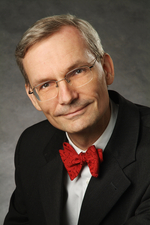
Michael F. Feldkamp is a German historian and journalist.
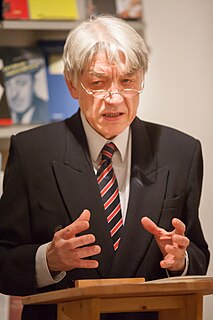
Wolfgang Kubin is a German poet, essayist, sinologist and translator of literary works. He is the former director of the Institute for Oriental and Asian Studies at the University of Bonn, Germany. Kubin has frequently been a guest professor at universities in China, for instance at Beijing Foreign Studies University, but also in Madison, Wisconsin and in Jerusalem. Since 1989, Kubin has been the editor of the journals ORIENTIERUNGEN: Zeitschrift zur Kultur Asiens and Minima sinica: Zeitschrift zum chinesischen Geist.
Hellmut Wilhelm was a German Sinologist known for his studies of both Chinese literature and Chinese history. Wilhelm was an expert on the ancient Chinese divination text I Ching , which he believed to represent the essence of Chinese thought. He also produced one of the most widely used German-Chinese dictionaries of the 20th century. He held teaching positions at Peking University and the University of Washington.
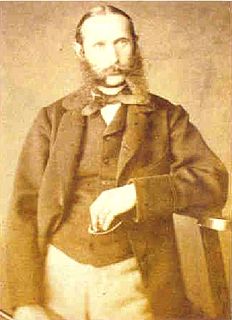
Maximilian August Scipio von Brandt was a German diplomat, East Asia expert and publicist.
Heinz Schilling is a German historian.
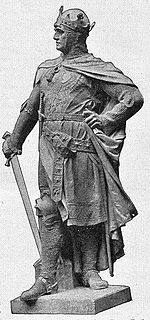
Albert II, Margrave of Brandenburg was a member of the House of Ascania. He was Margrave of Brandenburg from 1205 until his death in 1220.
Albert Herrmann was a German archaeologist and geographer. His specialty was the geography of the ancient Mediterranean and Chinese geography. He also published a number of works theorizing on the location of Atlantis.

Peter C.W. Hoffmann, FRSC is a German-Canadian professor of history at McGill University in Montreal, Canada. His principal area of research deals with the German Resistance against National Socialism, and in particular, the resistance efforts of Claus von Stauffenberg. Hoffmann lives in Canada and in Germany.
Krzysztof Miszczak – Polish scientist, political scientist, Germanist, sinologist, professor extraordinarius, diplomat.
Norbert Finzsch as Norbert Rollewitz is a German historian.
Gerhart Hass was a German historian. His approach reflected the Marxist prism through which East Germany's historical establishment viewed their subject. He worked at the History Institute, part of the Berlin based (East) German Academy of Sciences and Humanities, where from 1974 he was a professor. His work concentrated on the History of Fascism in Europe and the Second World War.
Wolfgang Leopold Friedrich Franke was a German sinologist whose research was focused on the history of the Ming dynasty and of the Chinese diaspora in Southeast Asia. He served as Chair of Sinology at the University of Hamburg for 27 years. His father Otto Franke, also a sinologist, had set up the chair in 1910.
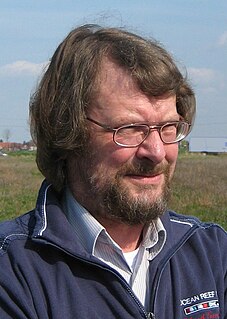
Holm Arno Leonhardt -- sometimes abbreviated to Holm A. Leonhardt, born October 12, 1952 -- is a German scientist in the fields of International Relations and economic history, especially in the realm of cartel history and theory. He was born in Manila (Philippines) the son of Brigitte and Arno Leonhardt. Arno became a German expatriate since 1930, moving up the career ladder from accountant to vice director in the branch office of an American paper machine company in Manila. Brigitte came from a liberal merchant family in Saxony (Germany) holding critical distance to the Nazi regime.
Klaus Mühlhahn is a German historian and sinologist who is a Professor and Vice President of the Free University of Berlin. He was awarded the John K. Fairbank Prize in 2009 for his book Criminal Justice in China: A History.
Dieter Gutknecht is a German musicologist and former University music director.
Michael Heinemann is a German musicologist and university professor.